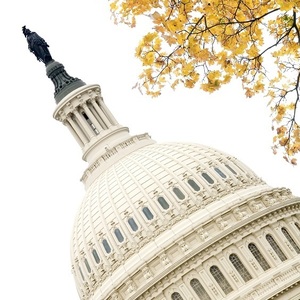Senators urge EPA to promulgate rule on biogenic carbon emissions

October 13, 2020
BY Erin Krueger
A group of 14 senators sent a letter to U.S. EPA Administrator Andrew Wheeler on Oct. 12 urging the agency to promulgate a rulemaking that recognizes the de minimis character of biogenic carbon emissions from agricultural feedstocks used to make food, fuel, beverages or bioproducts.
According to the letter, the Biogenic CO2 Coalition submitted a petition to EPA on Sept. 9 requesting such a rulemaking. “Moving forward on this request would provide clarity for key stakeholders and align EPA policy with the biogenic emissions standards,” the senators wrote. “These same standards are applied by every other regulatory authority worldwide in acknowledging that biogenic carbon emissions from agricultural feedstocks are different than carbon from fossil fuels.”
Advertisement
Advertisement
The senators note that the growing bioeconomy offers farmers an opportunity to enter new markets and diversify their customer base. “Consumers worldwide are increasingly demanding sustainable, plant-based products and materials, and the global marketplace is rising to meet that demand,” the senators wrote. “Global production of bioplastic is expected to grow 13 percent in the next five years, yet data indicates that the U.S. is falling behind its competitors in the international bioeconomy. Between 2014 and 2019, North America’s share of the global bioplastics market grew from 14 percent to just 18 percent, while Europe’s share increased from 15 percent to 25 percent, despite the U.S.’s position as a global leader in agricultural production.
“With the exception of EPA, environmental regulatory authorities worldwide distinguish between biogenic carbon emissions from agricultural crops and carbon emissions from fossil fuels,” they continued. “As a result, economies overseas have a substantial competitive advantage for construction, modernization and improvement of facilities relative to those here in the U.S. EPA’s current policy on biogenic CO2 emissions has slowed investment in the U.S. bioeconomy due to uncertainty surrounding the permitting process, litigation risks, and costs for new manufacturing and processing facilities. U.S. agribusinesses are positioned to make significant investments in facility modernization and improvements to support the development and production of renewable products and materials, however they need regulatory certainty. This is especially important to our rural communities that are dealing with the impacts of the global pandemic and a growing financial crisis among farmers, ranchers, and agricultural businesses due to low prices and damages caused by fires, droughts, and even a recent derecho.”
According to the senators, the EPA can open the door for increased production of sustainable plant-based products and materials by clarifying the insignificant nature of biogenic carbon emissions from agricultural crops. “Expanded production of plant-based products and materials, and in turn, the growth of the U.S. bioeconomy, promises to substantially reduce GHGs, improve water quality, divert waste from landfills, and increase soil health,” the senators wrote.
Advertisement
Advertisement
“Growing the U.S. bioeconomy offers a bright future for rural America, one that will bring more jobs and opportunities to the American heartland, offer American consumers more and better sustainable products, and bring much-needed support to America’s farmers and ranchers. For over 10 years, EPA has stated an intention to eliminate regulatory barriers preventing that potential from becoming reality,” they continued.
The letter is signed by Sens. Joni Ernst, R-Iowa; Deb Fischer, R-Neb.; Chuck Grassley, R-Iowa; John Thune, R-S.D.; Todd Young, R-Ind.; Mike Braun, R-Ind.; Richard Burr, R-N.C.; Kevin Cramer, R-N.D.; Michael Rounds, R-S.D.; John Hoeven, R-N.D.; Jerry Moran, R-Kan.; Pat Roberts, R-Kan.; Roy Blunt, R-Mo.; and Josh Hawley, R-Mo.
A full copy of the letter can be downloaded from Ernst’s website.
Related Stories
The USDA significantly increased its estimate for 2025-’26 soybean oil use in biofuel production in its latest World Agricultural Supply and Demand Estimates report, released July 11. The outlook for soybean production was revised down.
The U.S. Energy Information Administration maintained its forecast for 2025 and 2026 biodiesel, renewable diesel and sustainable aviation fuel (SAF) production in its latest Short-Term Energy Outlook, released July 8.
XCF Global Inc. on July 10 shared its strategic plan to invest close to $1 billion in developing a network of SAF production facilities, expanding its U.S. footprint, and advancing its international growth strategy.
U.S. fuel ethanol capacity fell slightly in April, while biodiesel and renewable diesel capacity held steady, according to data released by the U.S. EIA on June 30. Feedstock consumption was down when compared to the previous month.
XCF Global Inc. on July 8 provided a production update on its flagship New Rise Reno facility, underscoring that the plant has successfully produced SAF, renewable diesel, and renewable naphtha during its initial ramp-up.
Upcoming Events










